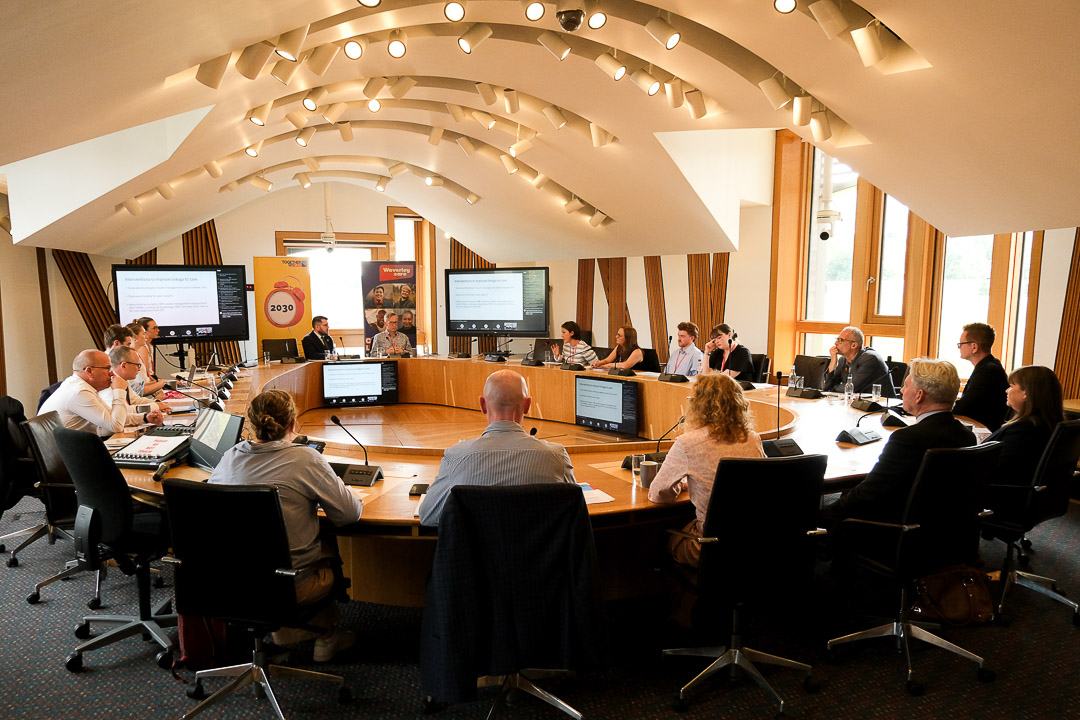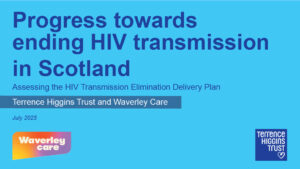
In partnership with Terrence Higgins Trust, we have today [31 July 2025] published: “Progress towards ending HIV transmission in Scotland: Assessing the HIV Transmission Elimination Delivery Plan.”
With five years remaining to deliver on the commitment to end new HIV transmissions by 2030, and a year out from the 2026 Scottish Parliament elections, it’s time to accelerate. As Scotland’s leading HIV charities, we have assessed progress to date and identified areas where urgent action is needed.
The Delivery Plan, published in March 2024, set out a framework for ending HIV transmission in Scotland by 2030. Commitments included the piloting of emergency department opt-out HIV testing in three Scottish health boards, pilots of the HIV prevention pill, PrEP, online and in primary care, and funding for new resources to address HIV stigma in health and social care settings.
Earlier this year, the Scottish Government went even further and committed to the roll-out of A&E opt-out HIV testing in NHS Greater Glasgow and Clyde and NHS Lothian, following a successful campaign by the HIV sector in Scotland.
This progress places Scotland in prime position to become one of the first countries in the world to end new cases of HIV. However, opportunities to make this goal a reality are being missed.
There are an estimated 500 people living with undiagnosed HIV in Scotland, and a growing number of people are diagnosed with HIV but are not engaged in treatment and care. HIV testing rates are still below pre-pandemic levels, and PrEP is not reaching everyone who could benefit from it.
To end new HIV transmission in Scotland by 2030, we are calling on the Scottish Government to:
- Deliver on the commitment to roll out opt-out HIV testing in A&Es in NHS Lothian and NHS Greater Glasgow and Clyde. This commitment must be funded, with ring-fenced investment for wrap-around support for those newly diagnosed with HIV or who are re-engaged in care.
- Enable PrEP access outside of sexual health clinics, including through community pharmacies.
- Fund a National HIV Testing Week to increase testing uptake and tackle HIV stigma.
- Invest in HIV support services and develop a national programme to re-engage the growing number of people lost to HIV care, who now represent nearly 20% of Scotland’s HIV-positive population.
- Commit multi-year funding to build upon the success of the anti-stigma campaign and improve HIV awareness in the health and social care sectors.
Download the scorecard
Grant Sugden, Chief Executive at Waverley Care, said:
“I am proud that Waverley Care and Terrence Higgins Trust have partnered to deliver our brand-new policy scorecard. With a final review of the first phase of the Scottish Government’s HIV Transmission Elimination Delivery Plan due next year, now is the right time to reflect on progress and refocus our efforts.
“I hope this scorecard supports a critical evaluation of what has been achieved so far, while also drawing renewed attention to key areas of the plan where progress has stalled.
“We must prioritise easier access to PrEP for all who need it, raise awareness of the importance of HIV testing, and urgently invest in re-engaging people who have been lost to HIV care. Only by acting now to galvanise Scotland’s HIV elimination efforts can we achieve our shared ambition for 2030.”
Richard Angell OBE, Chief Executive of Terrence Higgins Trust, said:
“The publication of Scotland’s HIV Transmission Elimination Delivery Plan last year marked a significant step in our mission to end new cases of HIV in Scotland by 2030. The plan has undoubtedly driven progress, and we are proud to have worked with the Scottish Government to have delivered some of these commitments.
“The data is clear: we must ramp up our efforts now or we will miss our goal. We must increase HIV testing; make PrEP accessible in pharmacies and online; and ensure that everyone living with HIV is supported to engage in care. The prize is great: get it right and Scotland could be the first country in the world to end new HIV cases, once and for all.”

